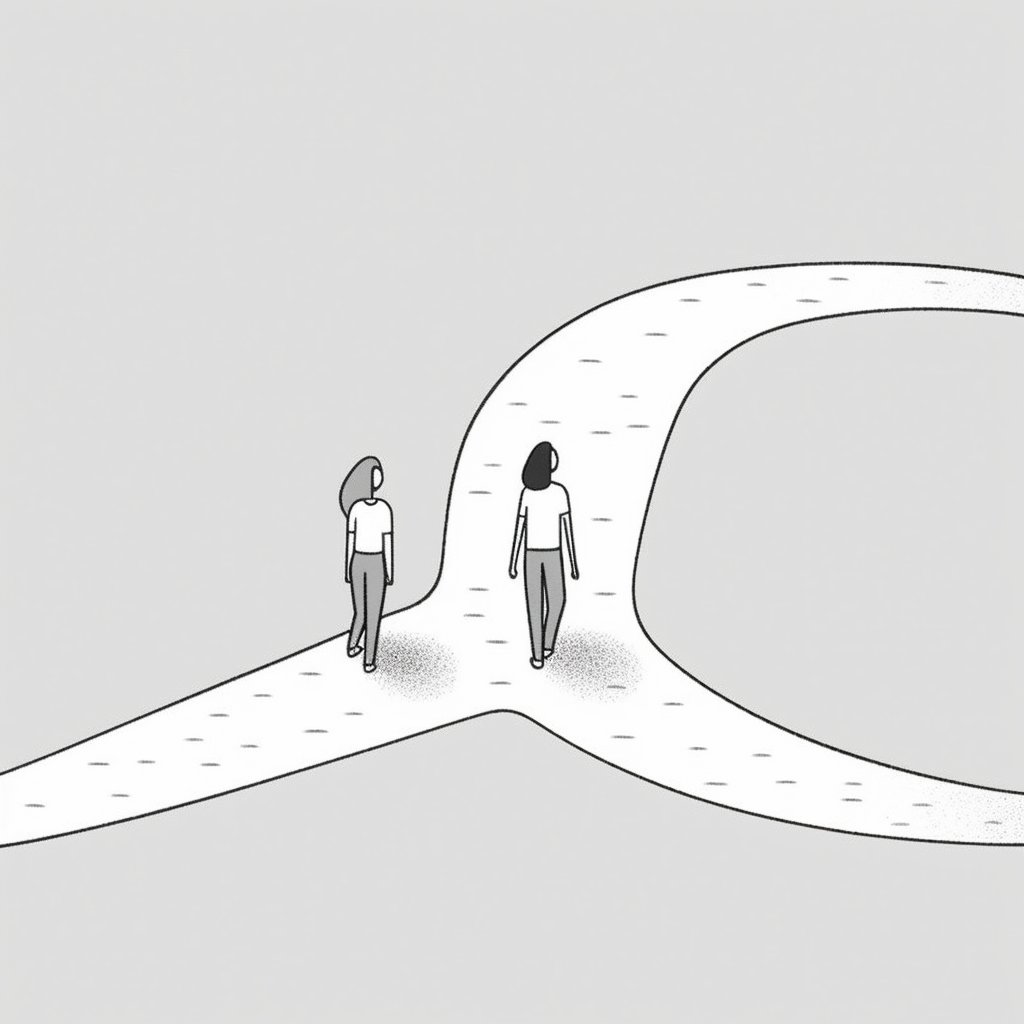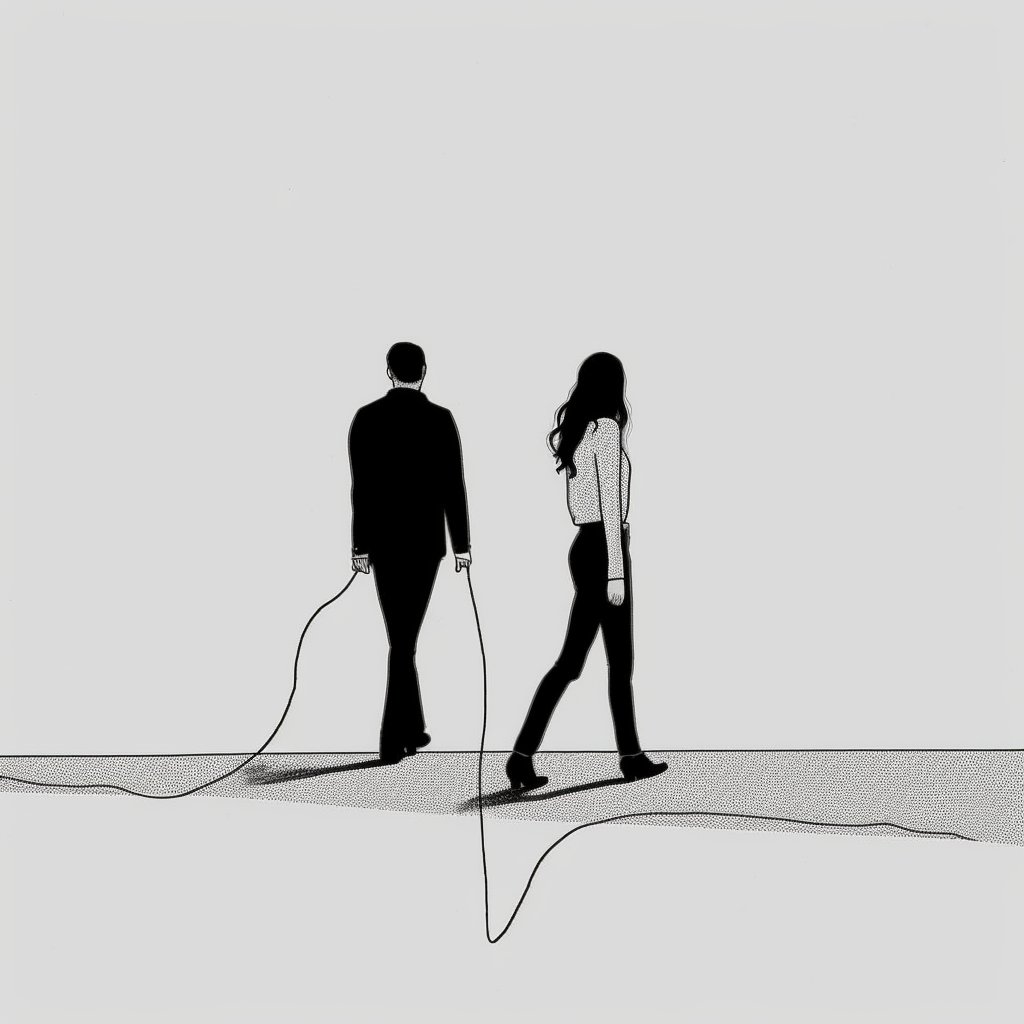Post-Breakup Anxiety | Separation Anxiety After Breakup

Breakups. Ugh, they can be the worst.
Like a rollercoaster ride of emotions that leaves you feeling dumped (literally and figuratively); unsure of what comes next.
On top of the sadness, anger, and confusion, there’s often this nagging anxiety after breakup that just won’t quit.
Am I right?
If you’re reading this, chances are you know exactly what I’m talking about…
That knot in your stomach, the constant worry, the fear of what the future holds – it’s all perfectly NORMAL. But normal doesn’t mean it has to be easy.
This post is here to help you navigate the often-confusing world of post-breakup anxiety. We’ll explore what it feels like, how bad it can get, and – most importantly – we’ll equip you with some kicking strategies to tame that anxiety and move on feeling stronger than ever.
So, grab a cup of tea (or your beverage of choice!), get comfy, and let’s break up with your breakup anxiety together.
What Does Anxiety After a Breakup Look Like?

Let’s face it, breakups are messy. And sometimes, that mess spills over into our mental state, manifesting as anxiety. This anxiety can show up in a few different ways, both emotionally and physically.
Post-Breakup Anxiety Symptoms
Emotional Symptoms
- Emotional rollercoaster: You might feel a constant wave of sadness, anger, confusion, or even guilt.
- Intrusive thoughts: Your ex might be starring in a personal horror movie on repeat in your head. Replaying arguments, wondering “what ifs,” and getting stuck in a cycle of negativity are all common.
- Fear of the future: The unknown can be scary, especially after a breakup. You might worry about being alone forever, never finding love again, or facing life’s challenges on your own.
Physical Symptoms
- Can’t sleep, won’t sleep: Anxiety can wreak havoc on your sleep schedule. You might toss and turn all night, or you could be sleeping way more than usual (either way, it’s not restful).
- Tummy troubles: Butterflies in your stomach? Anxiety can cause indigestion, nausea, or changes in appetite.
- Tension: Feeling constantly on edge, with tight muscles or headaches, is another way anxiety likes to express itself.
- Panic attacks: In some cases, anxiety can lead to full-blown panic attacks, which are intense surges of fear that come on quickly and can leave you feeling breathless, dizzy, or detached from reality.
| Related: Sleep Anxiety
How Severe Can It Get?
Breakup anxiety can range from mild to severe. For some people, it might be a passing annoyance, while others might experience debilitating symptoms that interfere with daily life.
Here’s a spectrum:
- Mild: Occasional worry, some trouble sleeping, but overall functioning remains okay.
- Moderate: More frequent anxiety symptoms, affecting sleep, concentration, and relationships.
- Severe: Constant anxiety, panic attacks, difficulty coping, and significant disruption to daily life. We recommend you seeking professional help, like talking to a therapist, if you’re feeling severe anxiety.
The important thing to remember is that no matter how severe your anxiety feels, there are ways to manage it and feel better.
| Read more: Post-Traumatic Relationship Syndrome
8 Ways to Deal with Your Anxiety After Breakup

Post-breakup anxiety can feel overwhelming, but there are effective strategies to help you manage it and move forward. Here are 8 powerful tools to add to your coping toolbox:
Mindfulness Can Be Helpful
Mindfulness practices like meditation or deep breathing exercises can help calm your nervous system and bring your focus to the present moment.
There are countless free guided meditations available online or through apps. Even just 10 minutes a day can significantly reduce anxiety. Meditation helps you train your attention to stay focused on the present moment, rather than getting swept away by the anxious thoughts swirling in your head.
Another powerful tool is deep breathing exercises. Imagine your anxiety as a balloon – with each slow, deep breath from your diaphragm, you’re slowly letting the air out of that balloon, allowing tension to ease and calmness to take hold. Inhale for a count of four, hold for a count of four, and exhale slowly for a count of eight. Repeat this several times until you feel your body and mind begin to relax.
Mindfulness practices like meditation and deep breathing can be your anchor. They help quiet your nervous system and bring your attention to the present moment. Instead of being hijacked by anxious thoughts, mindfulness allows you to simply watch them come and go, without judgement. This creates space for a calmer and more peaceful mind.
| Related: 10 Amazing Spiritual Self-Care Examples
Prioritize Your Health
Your body is your temple, and during a breakup, it’s more important than ever to treat it with respect. Fuel your body right by aiming for balanced meals packed with fruits, vegetables, and whole grains. Avoid sugary drinks and processed foods, which can worsen anxiety symptoms and leave you feeling sluggish.
Exercise is another wonderful way to reduce anxiety. Find an activity you genuinely enjoy, whether it’s dancing like nobody’s watching in your living room, joining a fun gym class with friends, or going for a brisk walk in nature. Aim for at least 30 minutes of moderate-intensity exercise most days of the week. Exercise is a natural stress reliever, and it also boosts the production of endorphins, those feel-good chemicals in your brain that can improve your mood and combat anxiety.
And finally, don’t underestimate the power of sleep. Aim for 7-8 hours of quality sleep each night. Establishing a regular sleep schedule is key – go to bed and wake up around the same time each day, even on weekends. Create a relaxing bedtime routine that might include taking a warm bath, reading a book, or listening to calming music. Avoid screen time for at least an hour before bed, as the blue light emitted from electronic devices can disrupt your sleep cycle.
Taking care of yourself physically is crucial for emotional well-being. Aim for a balanced diet with plenty of fruits, vegetables, and whole grains. Regular exercise is a fantastic stress reliever, so find an activity you enjoy, whether it’s dancing in your living room or going for a brisk walk outside. Getting enough quality sleep also plays a vital role in managing anxiety.
Related: Nutrition and Anxiety | The Impact of Diet on Anxiety
An Opportunity for Self-Discovery
A breakup, while painful, can be an unexpected opportunity for personal growth. Use this time to reconnect with yourself and rediscover your passions. Take some time each day to reflect on your thoughts and feelings. Journaling can be a powerful tool for self-discovery. Write down your fears, frustrations, and dreams for the future. This process can help you identify patterns, process emotions, and gain clarity on your goals.
Did you put a hobby on hold during your relationship? Now’s the perfect time to revisit it! Learning a new skill or reconnecting with an old interest can be incredibly rewarding. Maybe you’ve always wanted to learn to play the guitar, take a pottery class, or finally write that novel you’ve been dreaming about. Pursue your passions with gusto!
Also, you can consider taking a solo trip, even if it’s just a weekend getaway to a nearby town. Sometimes a change of scenery can do wonders for your mental well-being. Spending time alone can be incredibly empowering, allowing you to reconnect with yourself and discover your own strength and independence.
A breakup, while painful, can be an opportunity for personal growth. Use this time to reconnect with yourself. Explore hobbies you’ve neglected, take a class you’ve always been interested in, or simply spend some quality time alone reflecting on your goals and aspirations. This self-discovery can empower you and build your confidence.
Do the Things You Love
Remember all those fun things you used to do before your relationship? It’s time to dust them off and rediscover the joy they bring! Make a “Fun List” of activities that bring you a sense of accomplishment and make you smile. This could be anything from reading a book to spending quality time with your pet, going to a concert you’ve been wanting to see, or trying a new recipe you’ve been eyeing.
Block out dedicated time in your calendar for these activities. Treat yourself like you would an important appointment – stick to the schedule and prioritize your well-being. Don’t be afraid to get creative! Explore new hobbies or activities that pique your interest. Joining a club, taking a class, or volunteering for a cause you care about can be a great way to meet new people who share your passions and provide a welcome distraction from your anxiety.
Life shouldn’t be on hold just because you’re going through a breakup. Reconnect with activities that bring you joy and a sense of accomplishment. Whether it’s painting, playing music, reading a good book, or spending time in nature, prioritize activities that make you feel happy and fulfilled.
Lean on Your Friends and Family
Connecting with others is vital during difficult times. Don’t isolate yourself – reach out to loved ones who care about you and can offer emotional support. Let your friends and family know what you’re going through, and don’t be afraid to ask for help, even if it’s just a listening ear or a shoulder to cry on. A strong support system can be a lifeline during a breakup.
Consider joining a support group for people going through similar experiences. Talking to others who understand what you’re going through can be incredibly validating and help you feel less alone. Look online or ask your therapist for recommendations on support groups in your area.
Remember, your friends and family want to support you. Don’t be afraid to ask for help, even with simple things like errands or household chores. Taking some things off your plate can free up mental and emotional space for you to focus on healing.
Surround yourself with loved ones who can offer emotional support and a listening ear. Talking to supportive friends or family members can help you process your emotions and gain a fresh perspective.
Silence the “What Ifs” and “Whys”
Breakups can trigger a constant loop of negative thoughts in your head. Here’s how to break free:
When negative thoughts about the breakup start to spiral, challenge their validity. Are they based on facts or just anxious assumptions? For example, if you find yourself thinking “I’ll never find love again,” challenge that thought with something more grounded in reality, like “This is a difficult time, but there are plenty of good people in the world, and I will find love again when the time is right.”
Practicing gratitude can also be a powerful tool for shifting your focus away from negative thoughts. Focus on the positive aspects of your life, no matter how small. Write down three things you’re grateful for each day, like your supportive friends, your good health, or a beautiful sunset you witnessed. Shifting your focus to gratitude can reduce anxiety and improve your mood.
Limit social media stalking! We all know it’s tempting to constantly check your ex’s social media profiles, but resist the urge. Seeing them with someone new can worsen anxiety and hinder healing. If you find yourself constantly reaching for your phone, try deleting their social media profiles or asking a trusted friend to “hide” them for a while.
Ruminating over the past and dwelling on “what ifs” can fuel your anxiety. Instead, try to gently redirect your thoughts towards the present moment and focus on what you can control.
Alcohol Isn’t the Answer
Alcohol might seem like a temporary stress reliever, but it’s more like a wolf in sheep’s clothing. Alcohol is actually a depressant, and while it might numb the pain in the short term, it can worsen anxiety symptoms in the long run.
Find healthy alternatives to cope with difficult emotions. Take a relaxing bath, read a book, call a friend, or listen to calming music. These activities can help you manage your anxiety in a healthy way.
While it might seem tempting to numb the pain with alcohol, it can actually worsen anxiety symptoms in the long run. Stick to healthier coping mechanisms like exercise, relaxation techniques, or spending time with loved ones.
Therapy is Always a Safe Space
If your anxiety feels overwhelming or interferes with your daily life, don’t hesitate to seek professional help. A therapist can equip you with powerful coping skills and provide a safe space to process your emotions and navigate the complexities of your breakup. Consider finding a therapist who specializes in breakups, as they will have specific expertise in helping you heal and move forward.
Remember, therapy isn’t a sign of weakness; it’s a sign of strength. Don’t wait until you’re drowning in anxiety to reach out for help. Early intervention can prevent symptoms from worsening and help you move forward in a healthy way.
If your anxiety feels overwhelming or interferes with daily life, don’t hesitate to seek professional help. A therapist can equip you with powerful coping skills and provide a safe space to process your emotions.
What is Separation Anxiety After Breakup?

Regular breakup anxiety is tough enough, but for some people, the emotional rollercoaster gets even more intense with a condition called separation anxiety. This specific type of anxiety is triggered by the physical absence of your ex-partner. It’s like your brain throws a full-on tantrum every time you’re not together.
Here are some key signs of separation anxiety after a breakup:
- Difficulty Being Alone: Even short periods of solitude can feel unbearable. You might constantly crave your ex’s presence and feel a sense of panic when you’re apart.
- Constant Need to Know Their Whereabouts: You might find yourself constantly checking your phone, hoping for a message or call from your ex. The need to know where they are and what they’re doing can become a relentless obsession.
- Panic Attacks When Separated: Being apart from your ex can trigger full-blown panic attacks, characterized by intense fear, shortness of breath, and feelings of detachment from reality.
- Feeling Incomplete Without Your Ex: You might have a strong sense of incompleteness without your ex. They might feel like a missing puzzle piece, and the thought of being alone can be terrifying.
- Difficulty Forming New Relationships: The fear of abandonment associated with separation anxiety can make it difficult to trust and open up to new romantic partners.
Separation anxiety after a breakup is a specific anxiety triggered by the physical absence of your ex-partner. It manifests as difficulty being alone, a constant need to know their whereabouts, panic attacks when separated, and feeling incomplete without them. This fear of abandonment can also hinder forming new relationships.
| Related: Separation Anxiety in Relationships
How Long Does Separation Anxiety After a Breakup Typically Last?

The duration of separation anxiety after a breakup can vary greatly depending on the severity of the anxiety and the support system available. Here’s a breakdown:
Milder Cases:
In milder cases, separation anxiety might subside within a few weeks to months as you adjust to being alone and build your confidence.
Healing takes time, but with self-care and the support of loved ones, you can gradually become more comfortable being apart from your ex.
More Severe Cases:
In more severe cases, separation anxiety can persist for a longer period and significantly impact your daily life.
If anxiety feels overwhelming and interferes with your ability to function, don’t hesitate to seek professional help from a therapist.
Factors Affecting Duration:
- Severity of Breakup: A particularly messy or traumatic breakup can lead to more intense separation anxiety and a longer healing process.
- Coping Mechanisms: Having healthy coping mechanisms in place, like those we discussed earlier (mindfulness, exercise, social support), can significantly shorten the duration of separation anxiety.
- Underlying Conditions: Sometimes, separation anxiety can be a symptom of an underlying anxiety disorder. If you have a history of anxiety, it’s important to seek professional help to address the root cause.
There’s no one-size-fits-all answer to how long separation anxiety lasts. However, with the right support and healthy coping strategies, you can overcome this challenge and move forward with confidence.
Separation anxiety after a breakup can last anywhere from weeks to months for milder cases, depending on the healing process and support system. However, severe cases might persist longer and require professional help. Factors affecting the duration include the breakup’s intensity, your coping mechanisms, and any underlying anxiety disorders. The key takeaway is that with time, self-care, and healthy strategies, you can overcome separation anxiety after a breakup.
| Read more: Separation Anxiety in Teenage Relationships
HealWiser’s Last Piece of Advice
This breakup might feel like the end of the world now, but trust me, it’s not.
I know Breakups are tough. There’s no getting around it.
And separation anxiety after a breakup could worsen the situation. But here’s the most important thing to remember: you are strong, capable, and worthy of love. This breakup doesn’t define you. It’s just a season in your life and will end soon. Just hang in there and believe in hope.
Additionally, don’t hesitate to reach a therapist or ask for professional help if you think things are getting out of your hands.
Sharing your experiences can provide valuable insights and emotional support. So…
…share your story with Heal Wiser and others in the comments section below this post.






